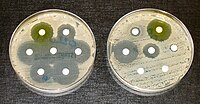
Photo from wikipedia
Antimicrobial resistance (AMR) is a global public health crisis that is now impacted by the COVID-19 pandemic. Little is known how COVID-19 risks influence people to consume antibiotics, particularly in… Click to show full abstract
Antimicrobial resistance (AMR) is a global public health crisis that is now impacted by the COVID-19 pandemic. Little is known how COVID-19 risks influence people to consume antibiotics, particularly in contexts like Bangladesh where these pharmaceuticals can be purchased without a prescription. This paper identifies the social drivers of antibiotics use among home-based patients who have tested positive with SARS-CoV-2 or have COVID-19-like symptoms. Using qualitative telephone interviews, the research was conducted in two Bangladesh cities with 40 participants who reported that they had tested positive for coronavirus (n = 20) or had COVID-19-like symptoms (n = 20). Our analysis identified five themes in antibiotic use narratives: antibiotics as ‘big’ medicine; managing anxiety; dealing with social repercussions of COVID-19 infection; lack of access to COVID-19 testing and healthcare services; and informal sources of treatment advice. Antibiotics were seen to solve physical and social aspects of COVID-19 infection, with urgent ramifications for AMR in Bangladesh and more general implications for global efforts to mitigate AMR.
Journal Title: PLoS ONE
Year Published: 2021
Link to full text (if available)
Share on Social Media: Sign Up to like & get
recommendations!